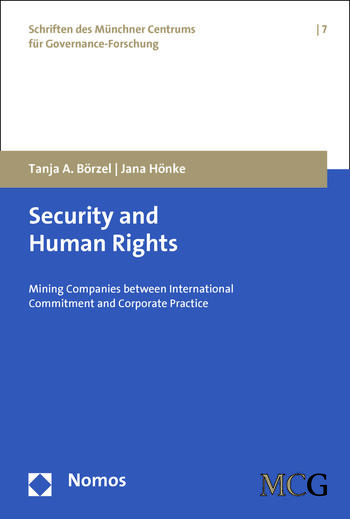Security and Human Rights. Mining Companies between International Commitment and Corporate Practice
Tanja A. Börzel, Jana Hönke – 2012
Multinationale Unternehmen werden zunehmend von transnationalen Institutionen auf freiwilliger Basis zu Menschenrechten und Sozialstandards verpflichtet. Die Studie untersucht in diesem Beitrag die Sicherheitspraktiken von Unternehmen und fragt, inwiefern sich diese an die Voluntary Principles on Security and Human Rights halten. Anhand von zwei multinationalen Bergbaufirmen in der Demokratischen Republik Kongo untersuchen sie die Wirkung dieser Standards auf die Sicherheitspraktiken der Firmen, nehmen darüber hinaus aber auch die Auswirkung der Firmenpraktiken auf die lokale Sicherheitslage in den Blick. Die Autorinnen argumentieren dass man über die Compliance-Forschung, die auf die Implementierung formaler Programme und regelkonformes Verhalten fokussiert, hinaus gehen muss um freiwillige Standards sowie die Wirkung von Unternehmen auf Sicherheit in Räumen begrenzter Staatlichkeit zu evaluieren. Dazu entwickeln sie einen „bottom-up“ Ansatz der die gesamte Spanne lokaler Sicherheitspraktiken von Unternehmen sowie ihre – oft negativen – Effekte in den Blick nimmt. Dieser Ansatz erlaubt eine differenziertere Bewertung der Wirkung freiwilliger Standards als auch der Beiträge von Unternehmen zu lokaler (Un)Sicherheit.
Transnational institutions increasingly commit multinational companies to human rights on a voluntary basis. This study investigates in this booklet the security practices of multinational companies and to what extent these comply with voluntary human rights standards, such as the Voluntary Principles on Security and Human Rights. And if so, wether solves problems of insecurity caused by the presence of these firms. Drawing on two case studies of multinational mining companies in the Democratic Republic of Congo, the authors argue that it is necessary to go beyond compliance research, which focuses on the implementation of formal programs from a top-down perspective, to evaluate voluntary standards and the effects of companies on local security. They therefore develop a conceptual framework from a ‘bottom-up perspective,’concentrating on the entire range of companies’ local security practices, including negative effects on local security. Such an approach draws a more nuanced picture of corporate security practices and allows for a more differentiated evaluation of voluntary standards and of contributions by companies to local (in)security.

